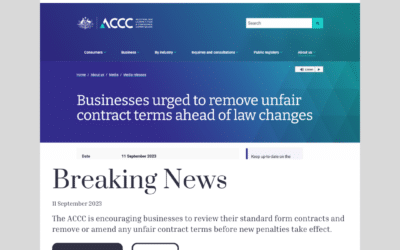ChatGPT as a part of the modern day technology culture must be a part of the way law firms operate as a business model.
ChatGPT as is a wonderful resource to be used in the way law firms operate and hopefully as the AI technology develops, improves and advances it might be the case that law firms can reach greater levels of accuracy efficiencies and automation towards legal services at cost-effective rates for clients. That said, the current technology has real limitations and there’s a long way to go before any “revolutionary” components can really take place, if at all in the long run.
ChatGPT is a resource in the AI technology space which can deliver massive impacts into the future depending on what happens and how much AI advances.
It’s still really early days and I don’t think AI will ever completely replace the lawyer-client relationship, but it can be a useful tool to remain abreast of at the top of our profession.
How can ChatGPT and AI have a positive impact on your day-to-day?
ChatGPT can be a useful resource and have a positive impact on day to day lawyer activities. At present with the current technology the way it is there are significant limitations for example, accuracy and core legal activities are irreplaceable whilst ChatGPT and AI can still be a resource to use.
Lawyers are used to technology and resource tools, and ChatGPT can be a useful way for research tasks to be done especially when it comes to younger lawyers. AI can be a good way for information to be gained while also requiring the actual human side of a lawyer to achieve the right level of flexibility and freedom for the lawyers ability to flourish with the resourcefulness of the technology.
ChatGPT and AI is currently very limited when it comes to real time application in the sense in which clients need to achieve outcomes involving strategic thinking, negotiation skills, a real sense of justice and application of legal precedent to a genuine set of facts for example in the complex style litigation and commercial transactions. These limits might be overcome as the technology develops in terms of what it can do.
How can ChatGPT help boutiques and sole practitioners drive efficiency, and why is this so important for smaller firms?
A small law firm, boutiques and sole practitioners don’t have the same level of resources like a larger firm. For example business and operational development is resource intensive meaning and a smaller law firm has to balance the time and monetary resources towards recruitment and training of staff, infrastructure and system improvements whilst ensuring client satisfaction continues with the firm’s growth.
With this in mind ChatGPT can be a valuable resource to the way smaller firms operate and as a resource towards efficiencies for example tasks like social media post caption ideas, blog posts and article outlines, content writing assistance and marketing style wording and text can all benefit through the AI invested into ChatGPT.
There’s a number of additional plugins for the greater use of ChatGPT. For example I personally like the ChatGPT with ChatGPT Chrome Extension because it can achieve better ways of accessing online content and whatever it is your looking for on the web in more efficient ways.
That said, I don’t believer ChatGPT will ever replace lawyers in terms of the day to day legal work and services provided to clients. Sure I may be limited in this view, but I don’t think ChatGPT or AI for that matter can properly replace the kinds of real time analytical skills, critical thinking, empathy and human relationship that’s required to properly serve clients to achieve the highest quality results in the way that clients’ legal matters deserve.
Is new tech and AI the future for smaller firms? Why/why not?
New tech and AI can be a useful resource, especially as clients are more cost sensitive than ever before. The online environment presents us with an overload of information and clients of small law firms often require costs to be lower which forces efficiencies to compete and stay in the game. AI can be a resource but will unlikely ever replace the genuine level of empathy and client understanding to achieve what clients need.
We also need to keep in mind the risks associated with teh new tech and AI resources, especially as cyber threats continue, and feed data information retained by law firms including on cloud services and online platforms is increasing. Overall, this does bring with it a greater risk and security measures must be developed and utilised to the professional obligations and client data remain secure, including with the operation of AI resources and online technologies like ChatGPT.
We will also need to remember the laws around copyright and IP especially when the AI gathers the available words online from the internet. We need to stay abreast of those kinds of dangers.
Any other relevant thoughts?
Whilst there’s opportunities on the horizon for AI like ChatGPT we need to keep in mind the real limitations and let us not get too carried away… not yet, if ever.
Newer and fresher insights and perspectives have always been a part of excellence in service delivery as a part of the legal profession. Negotiating contracts, reviewing documents and discovery are just some of the functions which can’t be done to the uppermost levels and standards alone by AI. Yet, technologies really can make these processes more efficient and effective for clients when working on the matters and issues involved.
It might still be early days because presently there is not a massive difference between say ChatGPT and what Google researching and other research tools can do. Whilst ChatGPT can assist in the content creation process, it can’t dive into the facts of a legal dispute, the commercial drivers of a complex commercial transaction, ethical duties and other things like that.
If we look at the good old days, our previous generations used to wash all of their dishes by hand- then the dishwasher was created and it’s a wonderful tool but if you have a really expensive piece of china you probably wouldn’t pop it in the dishwasher. Then there’s more care required than that.
Disclaimer
The material contained in this publication is of a general nature only and it is not, nor is intended to be, legal advice. If you wish to take any action based on the content of this publication, we recommend you seek professional legal advice.
🖤💛❤️
AMK Law acknowledges the Traditional Owners of the land on which we are fortunate to live and work. We pay our respects to Elders, both past and present and further acknowledge the important role that Indigenous people continue to play within our communities.
Book Your Appointment
Related Articles
Privilege Under Pressure: Insights from the Optus Case
A Shifting Legal Landscape Today's businesses are under constant threat from cyber attacks, making it increasingly important to understand how they can legally protect their private conversations. Legal professional privilege is a fundamental rule that keeps the...
Ticketek’s $500K Fine: A Legal Perspective on Email Compliance
In the constantly changing world of digital communication, email marketing remains a vital way for businesses to connect with their audience. However, it's crucial to manage this tool with care and attention to legal obligations. The Australian Communications and...
Navigating the Waters of Unfair Contract Terms in Australia
As a small business owner in Australia, you might have come across the recent updates to the Australian Consumer Law regarding unfair contract terms. If it seems a bit complex, don't worry! We're here to simplify it for you in clear terms. Unfair Contract...




